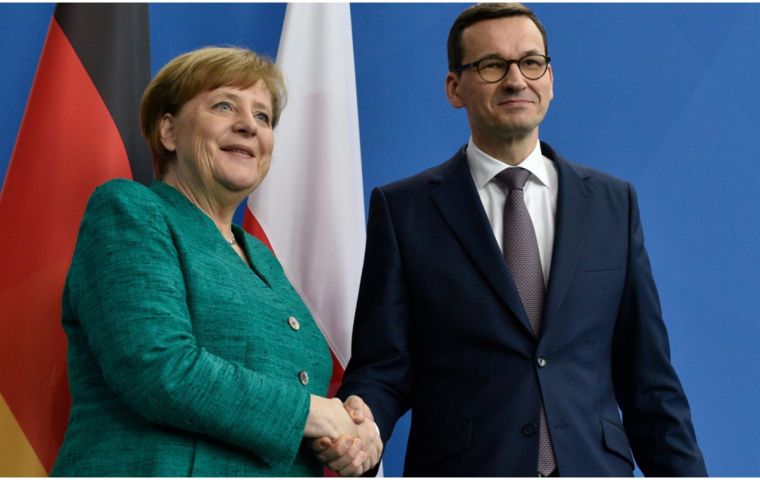MercoPress. South Atlantic News Agency
Poland and Germany inclined to strike a renewed Brexit deal with Britain
 Polish leader, Mateusz Morawiecki, disclosed that he had called German Chancellor Angela Merkel to urge her to find a way to break the deadlock
Polish leader, Mateusz Morawiecki, disclosed that he had called German Chancellor Angela Merkel to urge her to find a way to break the deadlock The Polish Prime Minister and senior German politicians have urged Brussels to strike a Brexit deal with Britain in the first sign of divisions within the European Union over its blanket opposition to offering fresh concessions to Theresa May.
EU leaders lined up on Wednesday to reject her new demand for the Withdrawal Agreement to be reopened to remove or fundamentally rewrite the contentious Irish backstop proposal. Jean-Claude Juncker, the European Commission president, warned that her move increased the prospect of Britain leaving the EU without a deal on 29 March.
But the Polish leader, Mateusz Morawiecki, disclosed that he had called German Chancellor Angela Merkel to urge her to find a way to break the deadlock. He added: “Acting together, with all EU members states, we should do our best to avoid hard Brexit.”
Poland is emerging as a leading voice arguing for the bloc to reach an accommodation with Britain. Last week its foreign minister suggested the Brexit impasse could be broken if a time-limited backstop of five years was agreed.
Prominent figures in Berlin also expressed anxiety over the initial reaction of Brussels to Tuesday’s Commons vote calling for the backstop to be stripped out of the withdrawal agreement. A senior German politician, Alexander Dobrindt, described it as “disconcerting” and called for greater flexibility by Brussels.
Mr Dobrindt, leader of the parliamentary group of the CSU party, added: “Stubbornness is not a European trait.” Detlef Seif, an MP for Ms Merkel’s Christian Democrats, attacked the “knee-jerk rejection of new negotiations” and warned: “There is too much at risk.”
Prime Minister Theresa May's official spokesman said: “There’s a genuine determination across Europe that the UK should not leave without a deal. We now need to work together to achieve a deal which can carry support in the Commons.”
Mrs May is not expected to travel to Brussels until next week by which time she aims to have concrete proposals to present to EU leaders. They could focus on plans to replace the backstop with technological solutions for monitoring the Irish border, making the backstop time-limited or giving Britain the unilateral right to withdraw from it.
UK government sources said they had always expected “noise” from the EU, but insisted Brussels could move towards an accommodation as Brexit day approached.
However, the challenge faced by Mrs May was underlined despite Mr Juncker saying he would stay in close contact with Downing Street and “listen to her ideas”. He told the European Parliament: “I will also be extremely clear about the position of the EU. Yesterday’s vote has further increased the risk of a disorderly exit of the UK.”
Tuesday’s Commons vote demanded the replacement of the backstop with “alternative arrangements” to avoid a hard border on the island of Ireland. But the EU’s chief negotiator Michel Barnier told MEPs that “no-one, on one side or the other, can say very clearly and precisely what form these alternative [Irish border] arrangements will take”.




Top Comments
Disclaimer & comment rulesCommenting for this story is now closed.
If you have a Facebook account, become a fan and comment on our Facebook Page!